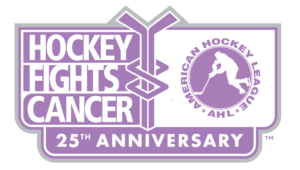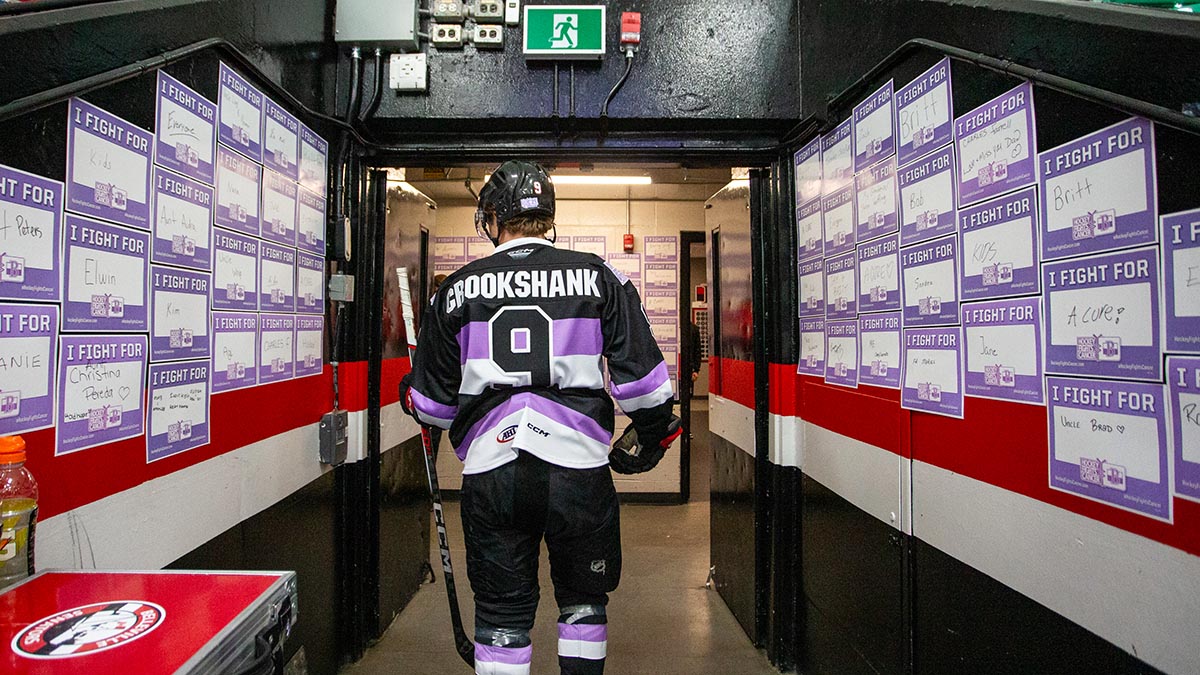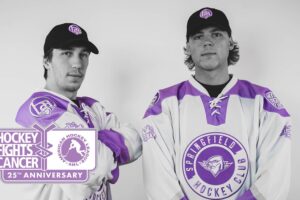![]() Patrick Williams, TheAHL.com Features Writer
Patrick Williams, TheAHL.com Features Writer
Hockey Fights Cancer is more than a work initiative for the American Hockey League head office.
It’s personal, and it has been for the past 25 years. Cancer doesn’t quit, but neither does the hockey world.
The NHL and the NHLPA formed Hockey Fights Cancer as a joint initiative in 1998 and quickly brought the AHL aboard. In the ensuing quarter-century, the effort has helped to raise more than $32 million to be directed toward a variety of local and national charities, children’s hospitals and research institutions.
This season 22 AHL clubs are hosting a Hockey Fights Cancer game. Maybe it’s a special jersey, dasherboard signage or stick tape decked out in the program’s trademark lavender. “I Fight For” cards, on which players, coaches, staff and fans can pay tribute to someone impacted by cancer, make for striking visuals. There are online initiatives, too. Fans can donate at HockeyFightsCancer.com and share their stories via social media using the #HockeyFightsCancer hashtag. Donations go to supporting the American Cancer Society and Canadian Cancer Society Lodges.
 Helping to guide those efforts at the AHL office is Chris Nikolis, the league’s executive vice president of business development. But as Nikolis will stress, the effort is widespread.
Helping to guide those efforts at the AHL office is Chris Nikolis, the league’s executive vice president of business development. But as Nikolis will stress, the effort is widespread.
“Our teams do so much in their cities. Our players – hockey players in general – are so great in the community. What the logo and those jerseys and those players mean at a school, at a food bank, a hospital visit, wearing a themed jersey on the ice, it’s immeasurable.
“To be able to take what they built – and they are the ones that build it, our players, our teams, our management and owners – and use it for an additional platform like Hockey Fights Cancer, it’s great.”
Nikolis was 13 years old when cancer claimed his grandfather. Each summer his grandfather visited from Greece and stayed with the Nikolis family. Chris recalls the impact his passing had on his father, Jim.
“The look on his face,” Nikolis said. “You’re 13, and you think people are going to be around forever. You learn pretty quickly that for whatever the reason, they might not be.”
Nikolis’s mother, Helen, is a breast cancer survivor. Jim died in 2015 at age 83, five months after his own cancer diagnosis. Chris’s father had outlasted other medical challenges, but cancer can be an unrelenting foe.
“I never met someone who listened to his doctors more than him,” Nikolis said. “If the doctor said don’t eat it, don’t do it, he didn’t. Period. Eventually cancer got him, because that was the one thing, at least for him, where the doctor’s advice just wasn’t enough.
“It’s cancer. It does its own thing.”
We can all relate to that. We have all seen family members, friends, or that person we admire have to confront cancer.
“Family. Friends. Young. Old. A favorite author, athlete. They add up,” Nikolis said. “It really can just wreck families. It takes a long time to sort all that out, and in some cases you still deal with it as you go.”
And while significant medical advancements have been made in combating cancer, there is still plenty of work to do. So how does the Hockey Fights Cancer initiative come together each year?
For the AHL, the National Hockey League shares a portfolio of documents, best practices, presentation decks, and more. Be it jerseys, game-night presentation, website efforts or something else, the AHL and its teams are able to tap into that information and then customize for a particular market, fan base and goal.
Earlier this month, for example, the Laval Rocket had their players sign a shoulder patch on their lavender jerseys with the name of a person for whom they wished to dedicate the night. Teams in the past have had fans sign a dasherboard with the names of loved ones affected by cancer.
Visual impact matters. Lavender is the official color for Hockey Fights Cancer, and teams develop unique looks for these nights.
“Our team staffs are terrific,” Nikolis said. “They brainstorm. They may see something that’s been done and adopt it and put their own spin on it.”
Nikolis takes his efforts outside of the office as well. An avid cyclist, Nikolis rides every year in the Pan-Mass Challenge, a bike-a-thon to raise funds for Dana-Farber Cancer Institute. With his wife, Denise, he also coordinates an annual PMC Kids Ride in Suffield, Conn.
Seeing loved ones dealing with cancer, Nikolis says, “steels people to do what they can to hopefully make it easier going forward for other families, and get to a point where this doesn’t happen. So many great hospitals, so many staff are working so hard on this that one day we’ll get there.
“It’ll be a great day.”
And that same spirit carries across the AHL.
“To help and contribute here to what our league does,” Nikolis says, “for me there’s nothing better. It’s really gratifying to see so many people in the sport – our teams and our players and our fans – coming together to show support, raise awareness, and raise funds. And those funds are going right to the people that need it the most – doctors and staff and researchers – to put an end to this thing, or in some cases just to make the lives more comfortable for people dealing with it.
“It all matters.”
TheAHL.com features writer Patrick Williams has been on the American Hockey League beat for nearly two decades for outlets including NHL.com, Sportsnet, TSN, The Hockey News, SiriusXM NHL Network Radio and SLAM! Sports, and was most recently the co-host of The Hockey News On The ‘A’ podcast. He was the recipient of the AHL’s James H. Ellery Memorial Award for his outstanding coverage of the league in 2016.






































